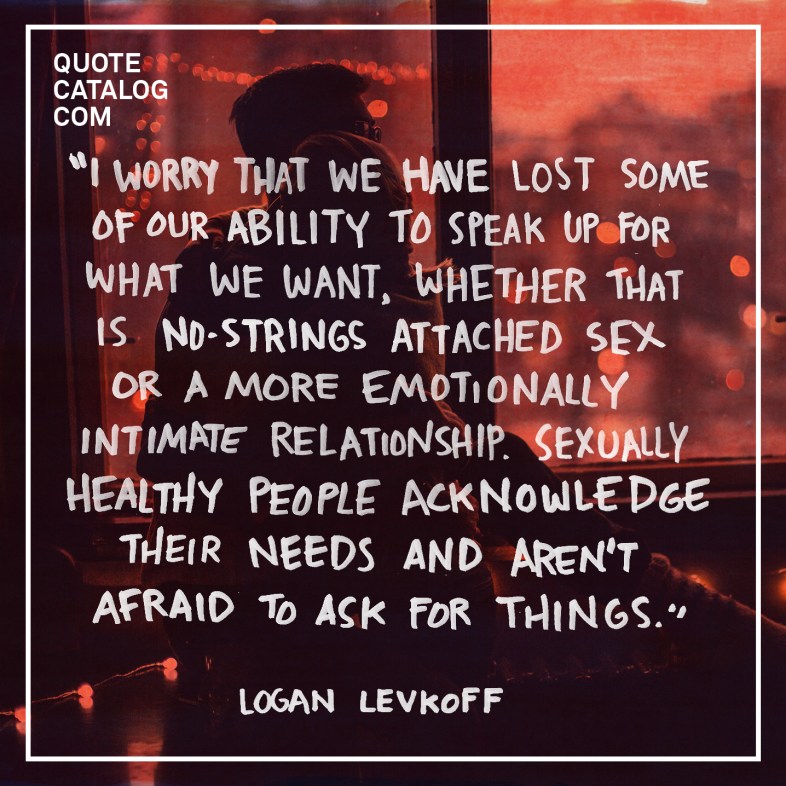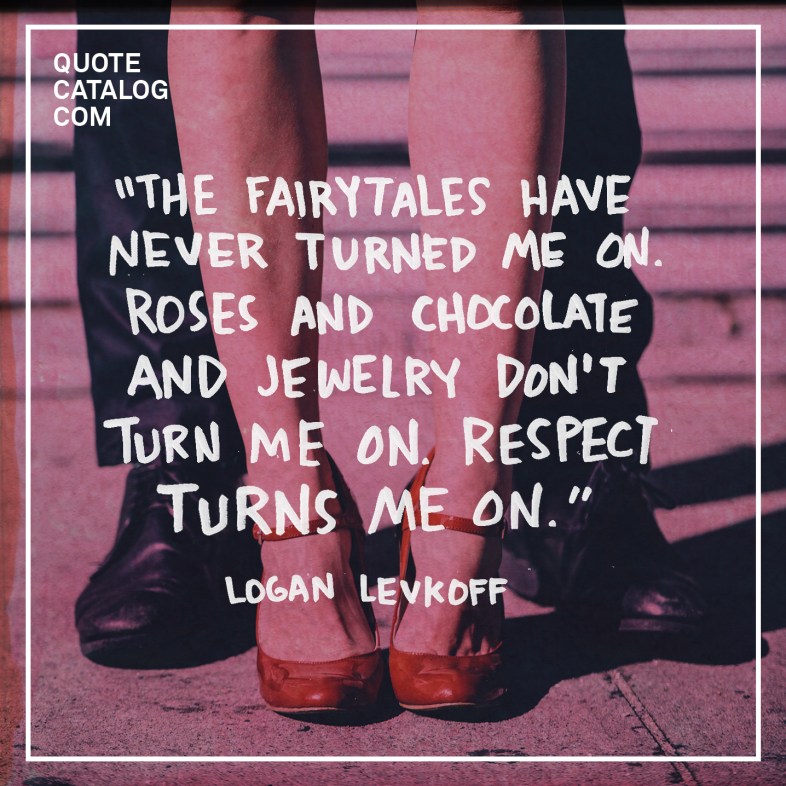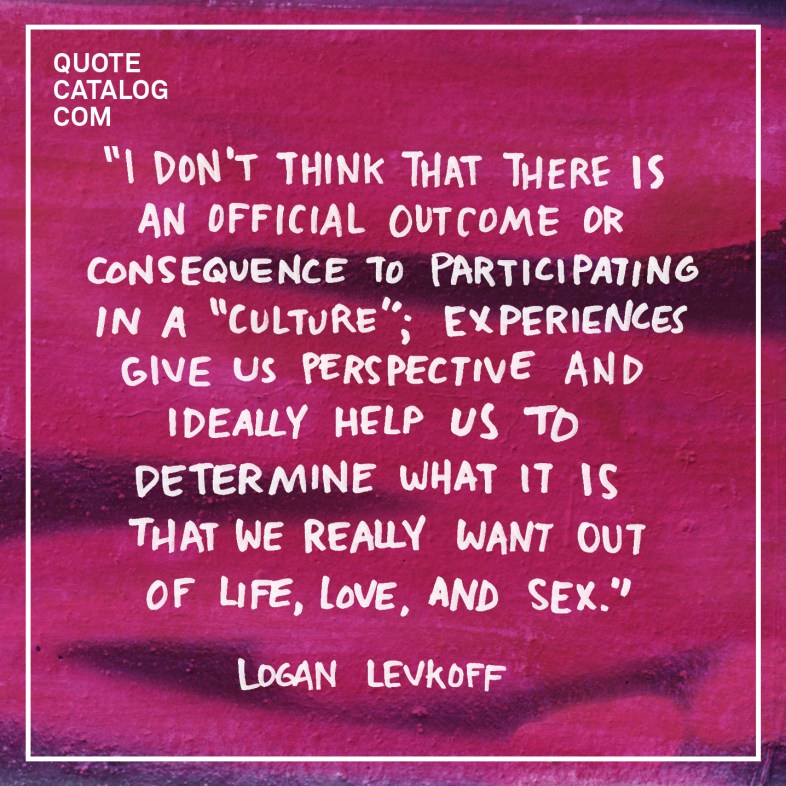
Thought Catalog: Hello Dr. Levkoff. Can you tell us a little bit about yourself and your background in order to get a better idea of your expertise and knowledge-base?
Logan Levkoff: Hi Kovie. Of course. I am a sexologist and sexuality educator. I started in this field as a peer HIV/AIDS educator when I was 15 years old. I was always comfortable talking about sexuality. I went to college and realized that there were not many public female voices on sex/uality that were positive, candid, and representative of what my peers and I were experiencing.
I tried to fill that void by continuing peer education, writing anonymous sex advice columns, and fairly provocative articles in our campus’ women’s paper. This was long before campus sex columns were popular. And I wound up getting a Masters and Ph.D. in human sexuality education.
I would say that I deal with all aspects of sex and sexuality but primarily I work teaching kids, teens, and parents – all in an effort to de-stigmatize sex and sexuality and encourage healthy communication about sex. And most recently, I am the sexuality expert on Married at First Sight.
TC: That is quite the career path. I would say not a lot of people know what a sexologist is or what they do on a long-term basis. Thank you for informing us. Now to get right to it, let’s talk firstly about Tinder culture which has been in the news in interesting ways in the last few weeks.
I will candidly say that I find the general idea of Tinder at best, harmless, and at worst, disheartening. On the one hand, I understand that we are in a technological generation, on the other, I think it is reducing meeting and mating to ordering a sandwich.
Perhaps there is nothing wrong with it in and of itself, but the way it has been applied seems to be riddled with, for lack of a better word, “interesting” consequences. One of them being people use the app for basically as much sex as possible – even though some may get on it with the intent to date, and maybe even to do so on a long-term basis. In the first place, what do you think of when I say, “Tinder culture,” and what are your thoughts on it?

LL: Such a good (and complicated) question. Tinder culture: short-term fun but perhaps not satisfying for the long-term. I have no problem with consenting adults having sex or looking for sex without seeking a “relationship.”
That being said, I am someone who believes that it is always important to be upfront and honest about what you want. I worry that we have lost some of our ability to speak up for what we want, whether that is no-strings attached sex or a more emotionally intimate relationship. Sexually healthy people acknowledge their needs and aren’t afraid to ask for things.
Now, I do think that Tinder is fascinating. I love that dating apps give us the opportunity to meet people we may have never encountered before, however, I would be lying if my heart didn’t break a little at the thought of a swipe based on a split second look at someone. Is sexual chemistry and attraction important? Yes. Is is enough to sustain a long-term relationship if nothing else is there? No.
One last thing: did Tinder create the hook up culture? Certainly NOT. I wrote something on Twitter recently that spoke to this. I wrote: Tinder creating the hook up culture is like Zima creating teen alcohol use in the 90s. These things already existed. Nothing new.
![]()
TC: Let’s talk about hook up culture. And I completely agree, I don’t think Tinder created hook up culture, but it is facilitating it. However, Tinder wouldn’t exist without hook up culture. Hook up culture is an interesting phenomenon to me.
In order to be forthcoming, I will say I do not participate in it for several reasons. But looking on as an outsider, and an outsider who enjoys analyzing cultural phenomena, I have found that many people who do participate in it, do not think of themselves as participating in it. It’s almost as if hook up culture is something that many who participate in it, still also want to distance themselves from.
But in light of books like Sex at Dawn, it does make it seem like modern-day views on sex prior to hook up culture were not quite in line with what our ancestors did tens, if not hundreds of thousands of years ago. Sex at Dawn contends that contrary to the “common narrative of human sexuality,” multiple sexual partners was common and accepted prior to the agricultural revolution in terms of human evolution. The text does this by comparing human mating systems to that of bonobos.
From a research perspective, I dispute some of the claims because the methodology seems to be unjustifiably selective in its sample use of bonobos, and the conclusions are based on a lot of circumstantial evidence. Not only that, but some of it cannot be confirmed by anthropological data, and negates the presence of biology and differences that exist in biology.
And I say this as someone who studies culture – but who also knows that sometimes social scientists get in their own way by holding out mere hypotheses as facts. And thus, the notions becomes tantamount to nothing more than pop psychology.
So tell me about hook up culture, its implications for society, and the consequences of engaging with material such as Sex at Dawn without reading or understanding critiques of it.
LL: I have trouble with the whole hook up culture, mostly because I think that it was a term used to describe what many people do when they are trying to navigate their own sexuality and their desires and feel empowered to do so.
The “HOOK UP CULTURE” may seem formal now simply because technology has made it more organized, but I struggle with it as a general term or description. I sometimes feel like when people use that term it is done to minimize people’s experiences rather than consider that those experiences (satisfying or not) help to create better ideas of what we need and what we want out of our partnerships.
Now, having said that, I have been in a monogamous relationship for 20 years. Do I believe that monogamy is the default “natural state” for all human beings? No.
I think that many people are monogamous because that is what our culture has dictated (regardless of whether or not we agree) and it helps to organize our lives. Of course, this isn’t true for everyone. There are many communities where families are blended, shared responsibilities among all people, and polyamory is accepted and respected.
I am a firm believer that anything that initiates a dialogue (ideally an intelligent one) about a subject is valuable. Sex at Dawn is one of those texts. It is fascinating and provides us with an opportunity to talk to the people in our lives about expectations in a relationship. I like to think that where I do my best work is helping people to make sense of what is in our culture – pop or otherwise.
![]()
TC: I definitely think that the word “natural” being applied to relationships – monogamous and otherwise – is skewed in favor of those who dispute monogamy as natural. This is to say, I think monogamy is natural to human nature, but it is not the only natural way to organize human relationships in society.
I know this because I’m an African and on both sides of my family directly, polygamy has been practiced at one point among my recent ancestors. So what I’m trying to say is I don’t think it’s an either/or thing. I think there is variance in natural occurring phenomenons; I think it is quite possible that there are multiple “natural” existences when it comes to mating in general, and especially long-term mating and relationship decisions.
Of course culture dictates and shapes as well, and I do think that human beings have to be humble to the notion that many of us do not know quite know when the natural starts and stops, and when the cultural starts and stops. I think it is a more prudent position to claim they are intertwined, that there are thin lines, and it probably changes as culture changes, and what we know about the science of the human experience changes.
But I want to get beyond that and get into why I think some of our dating practices may not be in line with long-term social desires. I’ve been thinking about this idea of the long-term self and the short-term self in many contexts.
Now the idea in this context is that the short-term self wants to engage in as much as “free love” or sex, as possible. But because of culture, many also want committed relationships in the long-term. The idea is however, if one pays attention only to the short-term self, is it possible that it comes as a consequence to the long-term self? Does any of that make sense at all?

LL: First, I agree with you on the monogamy issue. Just wanted to get that out of the way. There has never been one way to experience life.
Now, with respect to other issue, I think that I understand what you are getting at. I guess I am wondering, are you referring to emotional intimacy? Childbearing? Partnership in general?
I think that it is very easy for us to get swept up in our current place – whether that is age, expectations of peer group, and so on. While I don’t believe that paying too much attention to where we are now irreparably impacts our ability to be satisfied in the future, there is a small caveat to that. Childbearing.
While there are amazing reproductive technologies available to us, they are not simple solutions. I get the feeling that many people are afraid to talk about what they want in the future for fear that they will scare off potential mates, but if I have learned anything over the years, it is that we all have deal breakers.
We need to think about (and be candid about) what those non-negotiables are for us. (Though I would ask people to think about what’s behind that deal breaker to determine if it is a preference or if it is at all malleable. If not, that’s fine, too.)
![]()
TC: Let’s move on to our modern conceptions of dating, love, and commitments, including marriage. One of the ways in which culture really affects my perspective is in choosing long-term mates.
Now I have not yet read Aziz Ansari’s book Modern Romance although I read his excellent essay about it in Time, and I identified with some of what he had to say. When I observe American culture as an African in this context, it seems very romantic to me but not necessarily in a good way.
For all intents and purposes, I am a romantic. But my romanticism does not come at a cost of making practical decisions. And for me, commitments ought to involve pragmatism. This notion of fairy tale romance as the sole prerequisite for long-term commitments, especially marriage, is something I look at with a little hesitancy.
I don’t think that fairy tale love – which I do not mean to mock but I use in the sense of what our media texts have exposed to – is a guarantor of a lasting-commitment. I think one has to consider everything from (non-) religious values, to children, to the history of someone’s family, to career goals, to financial stability, amongst other things.
It sounds entirely unromantic but being the product of a 34+ year marriage if there’s anything my parents have insisted on, it’s that just love isn’t going to get you through. Respect and agreements on certain values, but also the little details of pragmatism that I’ve mentioned are what at least they have seen, makes marriage – which they can speak to – something long-lasting.
What do you think?
LL: Well, I’m not sure I could have said it better myself. I am not a romantic. The fairy tales have never turned me on. Roses and chocolate and jewelry don’t turn me on. Respect turns me on. And for me, I believe that respect leads to romance.
When partners feel valued, when their contributions to the relationship – whether those are financial, emotional, household, or familial – are respected, romance blossoms. Marriages should have at their core, love, but the type of love evolves over time. That evolution isn’t bad, it’s wonderful. It’s deep and solid.
Good marriages (or partnerships in general) are grounded in balance and equality, respect, communication, and an understanding of who someone is from a holistic perspective (who they are, where they come from, what they want, what their values are, and so on).
Is passion important? Yes, but the passion that comes from the novelty of a (new) relationship is going to change. If we believe all the headlines on the covers of women’s magazines that tell us how to keep things as hot as they were in the beginning, we are in trouble. If things aren’t as hot, we may assume that our partnership is failing. You can’t assume that. Relationships evolve.

TC: Yes, that absolutely make sense. For the record – I do love flowers though! (Haha) But to wrap this up, one of the things I think about in any cultural conversation that has to do with human beings making personal choices, especially in the context of something as vast and wide as sex and dating and love, is that none of us are unicorns.
I say this because people have this notion that we can simply ignore media texts and history and what we’re taught about sex, dating, and love from childhood – regardless of whatever culturally-specific messages we receive. But we know that is not possible in its entirety. Those things, even when we go against them are how we fundamentally formed our understanding of the world. Some of them, we might individually and as a society agree are worth changing – or one might disagree.
In studying human history and in observing humans, I think there is this generational observation that has been said many times – the solution of one generation becomes the problem of the next. For this culture, the sexual revolution, as its called, can be said to have fostered some of what we now call hook up culture – even though as you said, I think you’re right in that, that term might be limiting.
But it seems to me that because none of us are unicorns but culture is also dynamic, we’re in this place where on one hand, the previous generation’s solution became our “problem” – in the context of hook up culture, and on the other, we still want to form long-lasting relationships. But I get the sense this is becoming increasingly more difficult with that hook up cultural norm also being a facet of our generation.
What are we Millennials doing, and what are the consequences of what we’re doing?
LL: In general, I would say that participating in anything that doesn’t represent you or goes against your personal or cultural values is rarely going to be satisfying. What I would rather do is encourage – and in some cases give Millennials the freedom – to think about what it is that they really want and to not feel guilty if those wants are more traditional or more nontraditional.
What many of us do is find ourselves going through the motions because it is easy, and it is what is expected of us. I don’t think that there is an official outcome or consequence to participating in a “culture”; experiences give us perspective and ideally help us to determine what it is that we really want out of life, love, and sex.
The question we really need to be asking is: Are we using our experiences to think about the bigger issues or do we just go through the motions without thinking about what it is we really want or need? ![]()






